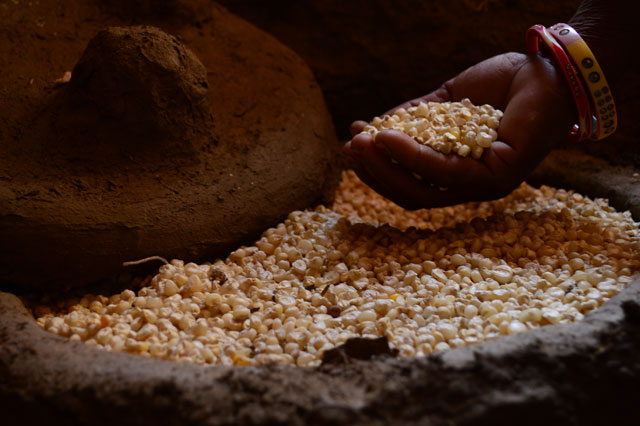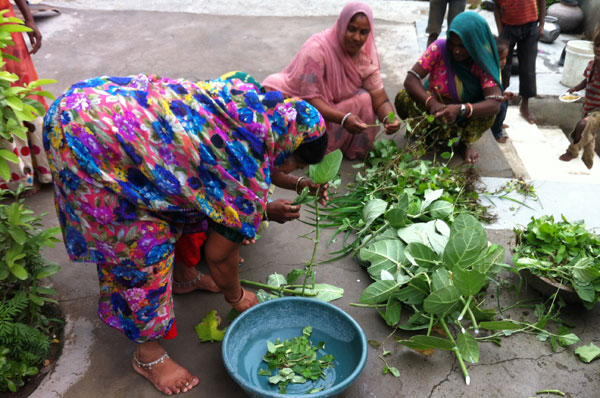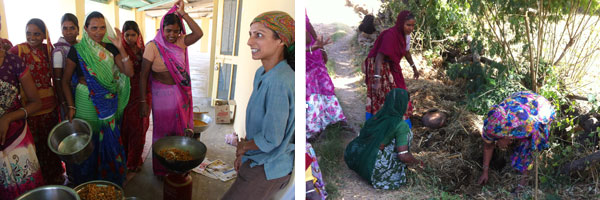about banyan roots
- Home
- Inspiration
gram swaraj
Modern vocabularies often use the words development and progress interchangeably, and this is more evident than ever before in the recent push to urbanize large swathes of India – in virtually every corner of the country, villages are making way for shiny malls and towering high-rises, while agrarian economies are being overtaken by large corporations with ambitious agendas. And yet, at the heart of it all, the food that fuels India’s people still draws its roots from the villages that modern Indians are so eager to leave behind.
The farmers that toil relentlessly to feed India’s booming population are often excluded from India’s contemporary narrative – today, farming is no longer a noble profession but one that breeds poverty and suffering in those who practice it, unless capitalistic means are adopted. Farmers can no longer afford to rely on their time-honed practices that place, above all else, the close and even sacred relationship between the farmer, his land and his crops. Instead, they are pushed to focus on production and quantity, propelled by this endless quest for ‘more’. The result? Soils weighted down by artificial fertilizers, crop sprayed with chemical pesticides and cows injected with a variety of medicines.
a culture of corruption
When viewed through a broader lens, India’s population is slowly but inevitably becoming what it eats. Our food is contaminated with greed, our bodies stripped of contentment by our insatiable appetite for monetary gains, and our lives robbed of vitality that is derived from sound mental, physical and emotional health.
Despite their best efforts, the farmers are still unable to buy their way into inclusion. They are still denied their due in terms of compensation and profits. This discourages them from considering farming a sustainable means of livelihood. Sons are sent off to the cities, in search of respectable, white-collar jobs and in search of a more fortuitous fate than their fathers have been bestowed with. Here again, their efforts come up short. Unable to keep up with their city competitors, they are perpetually banished to the fringes, where they are left with little choice but to make do with low-paying menial jobs and despicable standards of living.
In their efforts to address the situation and break this seemingly endless vicious cycle, the Government of India has devised several employment schemes such as NREGA, which only serves to further add to this decline in the number of farmers. Cash crops are already replacing food crops to fill up the coffers of large companies and corporations, to the extent India is struggling to feed her people. Ironically, a country where agriculture still employs roughly 50 percent of the workforce is now dependent on other countries for food.



striving for self-sufficiency
Our quest for self-sufficiency therefore begins with a conscious effort to safeguard the country’s agricultural state. A look back at the history of the Mewar province highlights the significance of food self-sufficiency in safeguarding a region’s sovereignty – while staging their attacks on Mewar, the erstwhile Mughal emperors had harnessed the strategy of shutting down the paths leading to the various kingdoms. This meant that the people within each kingdom would be deprived of food, and would eventually weaken and die. The strategy had proved successful in other territories; however, in Mewar, which was already self-reliant for food, the Mughal offensive failed.
India still has much ground to cover before it can revert to its lost days of agrarian glory. The country’s villages must be self-sufficient and Banyan Roots hopes to facilitate this, beginning with the villages of the Meward region. We are working to ensure that everything a farm needs to sustain itself is prepared and available within the farm. Farmers must be engaged in a positive, harmonious relationship with their land. They must nourish their crop not only with tradition-honoured practices but also with their own positive energy. This will ensure that the land’s ecological balance is preserved and that food is grown with love.
Banyan Roots is working to develop a model village community that is able to sustain itself through fair agricultural practices and is also equipped to process the food needed to feed its people within the village. This transformation must be deep-rooted and seeded into the consciousness of every man, woman and child. People will continue to learn important lessons from Nature and cherish their relationship with their land. Children will be inspired once again to stay committed to their roots. Most importantly, every life nourished by the food produced in these villages will be enriched with deep values and a lasting bond of love.
acharyashree vidyasagar maharaj











